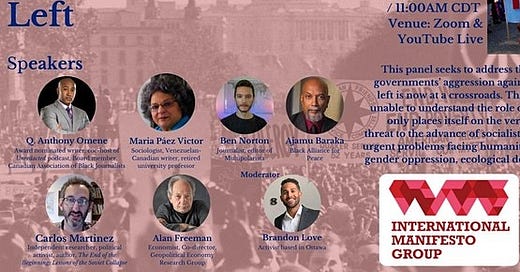Anti-Imperialism & the Western Left
An anti-imperialist vanguard in the West, formed by the people
The International Manifesto Group sponsored on April 24 a Webinar on “Anti-Imperialism & the Western Left.” The organizers maintain that, although an anti-imperialist Left is emerging, it is criticized by many liberals and leftists who do not understand the central importance of imperialism and anti-imperialist resistance in today’s geopolitical landscape. If the Western Left does not understand the centrality of the contradiction between imperialism and anti-imperialism, it cannot advance the peoples’ struggle for socialism.
My commentary today reviews five of the presentations at the April 24 Webinar.
Benjamin Norton is a journalist, writer, and filmmaker; he is the founder and editor of the independent media outlet, Multipolarista, where he reports in both English and Spanish. His journalism focuses primarily on U.S. foreign policy and geopolitics. He has reported from many countries around the world and is currently based in Nicaragua.
Norton notes that, in the h…



